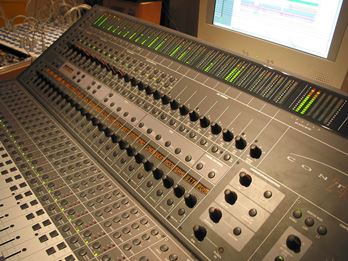Working together, to create something YOUnique
Online Audio Mix and Master Services
RapBeatsOne Studio offers radio-ready quality mix and master professional services. It is the passion of my life and I invest my soul in every song until it sounds perfect.
Our online audio mixing and mastering services
With RapBeatsOne Studio, opt for inexpensive online audio mix and mastering! After your order, our sound engineers take care of everything and are present throughout your project. Send us your separate tracks for our complete service: audio mix and mastering or your song for a single mastering.
Our priority is your satisfaction, so we’ll do as many touch-ups as you want. The rendering will be of quality and will meet all your requirements. Our online mix and mastering studio supports you in all your musical projects and whatever the style. Indeed, we work with all types of artists who record in home studios or professional studios.
Our studio harmonizes your songs and reveals their potential thanks to professional audio mastering. When ordering for audio mix and mastering, let us know your wishes and expectations. The work of your piece will be more than personal and adapted to your needs.
So if you have a musical project and need our know-how and experience, contact us! Or order your audio mix and mastering online now.
This is how mix and master services work:
You create your music
Step one of the process is recording and producing your song in any studio!
Upload your music
Make a compressed zip folder of your files. Send files using WeTransfer.com to [email protected]
I mix and master your music
I perfect and make sure the music is radio-ready, EVERY TIME. I then send you the completed product.
You download your music
Download the final mix and master then break down the mix. Request unlimited revisions free of charge.
Online mix and master studio
RapBeats.one Studio is a professional online mix and master studio. You can entrust us with your musical projects at unbeatable prices. After recording your tracks (vocals and/or virtual or physical instruments), you can send them to us for editing, mixing, and mastering.
This involves, among other things, grouping your different recordings while processing them separately to create the perfect song that suits you.
Why choose our online mixing and mastering studio?
We work with many artists from all walks of life. In addition, we master all musical styles but we are pros at rap beats. And above all, we will always carry out as much retouching as you want in order to obtain a rendering that suits you.
Our team of sound engineers has exceptional equipment as well as the latest plugins in terms of Mixing and Mastering.
We met artists working in Home-Studio, like artists working in professional studios. Today, we offer our experience through our exclusive training courses, in order to teach you how to carry out your own professional Mixing and Mastering from home.
The entire team of the RapBeats.one Studio is an online mix and master studio supports you throughout your musical projects.
Our mix and master values


The studio that listens to you
SATISFACTION GUARANTEED
With RapBeats.one Studio, do not take any risks, we will always carry out as many mixes and master alterations as necessary on your project until you are fully satisfied.

SECURITY
Your creations are only accessible to mix and master sound engineers who are members of our studio, rigorously selected by us.
![]() Don’t forget to play the music, not the instrument
Don’t forget to play the music, not the instrument
Mix and master FAQ

Mixing involves adjusting and combining individual tracks into a stereo or multichannel format, a.k.a. the mix. Mastering involves processing your mix into its final form so that it’s ready for distribution, which may include transitioning and sequencing the songs.
Mixing and mastering are terms that you hear a lot in the music business but that most people confuse. These are two essential steps when producing a song. There’s composing, recording, mixing, mastering, and pressing.
This is why today we are going to clarify all this by starting by briefly recalling what happens in each of the stages mentioned above.
The composition
This is the artistic part that you all know. We find the melody, the lyrics, the beginning of an instrumental idea, and the atmosphere (If you are interested in articles regarding, for example, tips to better structure your creative phase, how to find inspiration, etc., let us know in the comments :))
The record
Once you have your idea for a song in mind, it’s time to put it down. You record the different tracks depending on the instruments, vocals, rhythm you want to add. This is multitrack recording, or “stem-mixing”. Each component of the song has its own track which is recorded separately from the others.
Favor this phase, it is the one that takes the most time since you will continue to find ideas, modify the lyrics or the initial melody. There will inevitably be several versions of the same title during this period until you are fully satisfied.
The arrangements
It is a question of bringing the “make-up” necessary to orchestrate the composition. We also call this stage in the rap world for example the excessive “production” or “prod” of the title.
It is during this step that all the orchestration such as strings, synths, effects, and all types of analog or digital instruments are added.
Mixing
Once the arrangements are complete, the tracks need to be mixed. That is to say?
Mixing adjusts the levels of all tracks to form a seamless whole. There can be several voices, different instruments like guitar, piano, bass, etc.
It is then necessary to be able to find a good balance between the level and the frequencies of the various sounds present of each track so as not to hear too much of an instrument which one would prefer to put in the background for example.
We then balance the low, medium, and high frequencies in a harmonious way between the instruments (we speak for example of sidechains to balance the intervention between the bass and the drums. We use this a compressor instead of monitoring the levels on all the title which would take much longer!) with EQ, dynamics or compression, and depth using reverbs and delays for example.
Finally, we insert different effects (or not) to possibly bring a personal touch.
You could compare this to the scales you do before a concert so that the instruments and microphones are not too loud in relation to each other. Except that here, we are not talking about live but studio; the “balances” are made after having recorded the tracks in a much more precise way: this is what is called mixing.
What tools to mix?
There are a lot of mixing software out there, it’s up to you to choose the one that suits you best depending on your grip and the hardware you have. Here is the list of some of the best digital audio stations:
- Adobe Audition
- Logic
- Cubase
- Pro Tools
- Bitwig
- Ableton Live
- FL Studio 11
- Reaper
- Studio One 3
What is mastering?
Mastering is the step of preparing the track so that it is ready to be pressed in CD, Vinyl, Radio, streaming platform, etc. Once the title is mixed, we can say that it is “finished”, but the mastering makes it possible to make corrections, adjustments so that it is ready for broadcast.
It is therefore a question of mixing the title as a whole.
Tracks, such as vocals or the main instrument, are best emphasized after this phase. It is also used to make the album coherent by using the same settings for all the songs so that there is not one title that is “out of step” with respect to the others. Mastering thus gives a “color” to the album and can also create your identity to stand out from other artists musically.
Some tips for mastering your song
In general, it is better to ask someone outside to do the mastering because that one will have a more objective opinion and perspective on the song. His decisions will be more relevant than those of the person who created the track and made the mix.
However, before embarking on mastering you have to be sure that your mix is solid and that you like it. It is not a correction of the mixing but the preparation for the diffusion to the general public.
Which frequencies for which medium?
Mastering modulates frequencies according to the listening medium to properly hear all the instruments regardless of the format that the song will have.
- Human ear up to 20KHz
- 44.1KHz Compact Disc (CD)
The great myth about mastering is that it is a magical process that will make your mixes better. The truth is, mastering is a simple process that can’t do much for crappy mixes. If your mixes are good, then you won’t need mastering to improve them.
The average cost for professional mixing and mastering services varies from $150 to $700 per song to receive a good quality product. When working with top producers, the pricing can get into the $1,000’s. But, with any other studio, you can still obtain a radio-worthy product with a budget of $200 per song.
Here’s a summary of the steps you’ll need to take when you master your mix:
- Optimize your listening space.
- Finish your mix (to sound mastered).
- Check the levels.
- Bounce down your stereo track.
- Take a break (of at least a day).
- Create a new project and import your references.
- Listen for the first time (and take notes).
By mixing and mastering your tracks, you are making sure your music sounds the best that it can on all speakers, platforms, media formats, and devices. To stand out you simply have to be the best. You have mere seconds to grab the listener’s attention before they skip the song and forget you.
A very basic mix of a single vocal line and backing track may only take an hour or so, but a complex mix of a multi-track recording requiring many edits and automation of track levels, panning, and effect parameters can easily take eight hours or more.
Mastering is difficult because of the frequency spectrum and level profiles already present in a stereo mix. Although multi-band compression can sometimes boost transients in specific frequencies, they cannot target specific instruments, unless those instruments are all that is audible at a given frequency.
The simple answer is that all serious artists include mastering as part of their music release plan. …
Because artists rarely officially release music without it going through the mix and mastering process. Mastering puts a final sheen on the recording you worked so hard to create and the mix you went over with the engineer.
Most music professionals will tell you that you should never mix and master your own music. I believe that under certain circumstances, it’s perfectly fine to mix and master your own songs. Yes, even if I make a living as a mixing and mastering engineer.
How Loud Should My Track Be Before Mastering? If you want to send your mix off to get mastered, you should aim for around -6dB Peak, and anywhere from -23 dBFS RMS or LUFS to -18 dBFS RMS or LUFS average.
A WAV. file or an AIFF. file are the best file formats for mastering. Both offer an uncompressed, and full-spectrum recording, worthy of further processing and eventual distribution.
How to Make Your Mix Sound Bigger
- EQ Up Lows and Highs. Pull up an equalizer and boost the low end ever so slightly to add a bit of richness to the bass. …
- Layer Up. Adding more layers is one of the easiest ways to bring more texture and depth to your mix.
- Add Some Reverb. …
- 808 Kick Drum. …
- Widen Your Stereo Image.
Simply put, mix and master is the process of making a track sound good. Mixing typically takes place after the recording stage, though some prefer to mix while they record/write the music. Like any creative endeavor, it is an art form — every engineer will have their own battle-tested process.

